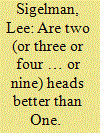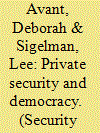| Srl | Item |
| 1 |
ID:
090931


|
|
|
|
|
| Publication |
2009.
|
| Summary/Abstract |
Although collaborative research has become much more common in the social sciences, including political science, little is known about the consequences of collaboration. This article uses papers submitted to the American Political Science Review to assess whether the widely acknowledged benefits of collaboration produced papers that were more likely to be accepted for publication. The results indicate that collaboration per se made little or no difference, but that the disciplinary configuration of the authors did result in differences in the success of these submissions.
|
|
|
|
|
|
|
|
|
|
|
|
|
|
|
|
| 2 |
ID:
097370


|
|
|
|
|
| Publication |
2010.
|
| Summary/Abstract |
Arguments about the importance of democracy for international behavior assume that states rely on military organizations rather than "hired guns." With the growth of the private security market this assumption no longer holds true. Focusing on the United States, we use original data to compare the impacts of using private military/security forces and military forces on attributes identified as endemic to democracies: constitutionalism, transparency, and public consent. Our evidence indicates that forces raised via contract are harder to learn about and thus less transparent than military forces. Largely due to lowered transparency, Congress has a harder time exercising its constitutional role, which impedes constitutionalism. Finally, though the public is just as sensitive to the deaths of private forces as it is to military deaths, it is less likely to know about them. Thus the lack of transparency also circumvents meaningful public consent. We conclude with a consideration of the potential implications of these changes for U.S. foreign policy.
|
|
|
|
|
|
|
|
|
|
|
|
|
|
|
|